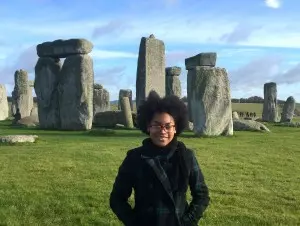A Colonized Body in the Colonial Empire


Every time I attend my British History course titled Remembering Slavery, I feel a complex array of emotions. As I listen to discussions on Britain’s role in Atlantic slavery and the way it is remembered, I cannot help but feel the weight of my status as a colonized body in the colonial empire.
Although I left Jamaica at the age of 9, I have always clung tightly to my Jamaican heritage. It served as an anchor for me as I navigated my assimilation into American culture. While in America my heritage has always been a point of pride, it became a point for somber reflection in Britain as I delved into England’s conquest of Jamaica in my coursework.
In Remembering Slavery, we work to understand the ties between Britain and slavery and how they have been interpreted throughout the years. Although I thought that this course would be like any other, I could not help the discomfort I felt as we looked through British records of absentee slave-owners who received compensation upon the abolition of slavery. My mind began to wonder if any of the men and women in the record that shared my surname had owned my ancestors.
Even though I had spent years in the States learning about slavery and the horrors committed under this ‘peculiar institution’, it never hit quite as close to home as it did in that moment.In England — the nation that held Jamaica as a colony until 1962—I am constantly brought face-to-face with the realities of my roots. Thus the ties forged between England and Jamaica through colonialism complicate my perception of self during my time abroad. In the States I never think twice about telling people of my Jamaican heritage. However as a study abroad student in London, I find it harder to decide which of my identities I should claim. In light of the undeniable links that colonialism has wrought between Jamaica and England, I feel that I have an obligation to attest to my Jamaican lineage. However, I am studying abroad from an American college, I have lived most of my life in America, and I sound American. Although none of this ever deterred me from proudly declaring my Jamaican heritage in the U.S., it has complicated my status in London where people expect me to say that I am American. Thus I constantly play with the idea of explaining my full background, but often surrender to the ease of simply being American. Yet I cannot shake the duty I feel to my Jamaican lineage, especially in my Remembering Slavery course. During many moments in this course, I am overcome by a desire to reveal my dual identity. When we debate whether or not absentee slave-ownership drained England’s Caribbean colonies of the economic and social capital they needed to forge prosperous societies, I want to stand as a testament to the resilience of the colonized people. I want to speak for Jamaica and attest to all of the ways we have been successful despite the years of oppression placed upon us by British slavery and imperialism. In conversations about Jamaica’s recent call for Britain to pay reparations for the lasting economic, social, and cultural wounds that it imposed, I am swept by the urge to stand in support.
Nevertheless, I find myself questioning how and if I can take such a stand when to my classmates, I am nothing but American.Consequently, over the past few months I have realized that I do not quite know who I am in England. The parts of my identity that are so clear to me in the States seem to have been muddled in my journey across the Atlantic Ocean. Am I Jamaican? Am I American? Or can I be both without allowing one to overpower the other? This interplay of identities is something that I am constantly battling with in the U.K. With every new introduction, I must decide which of my identities I will claim or find a way to convince others and myself that I can be both.